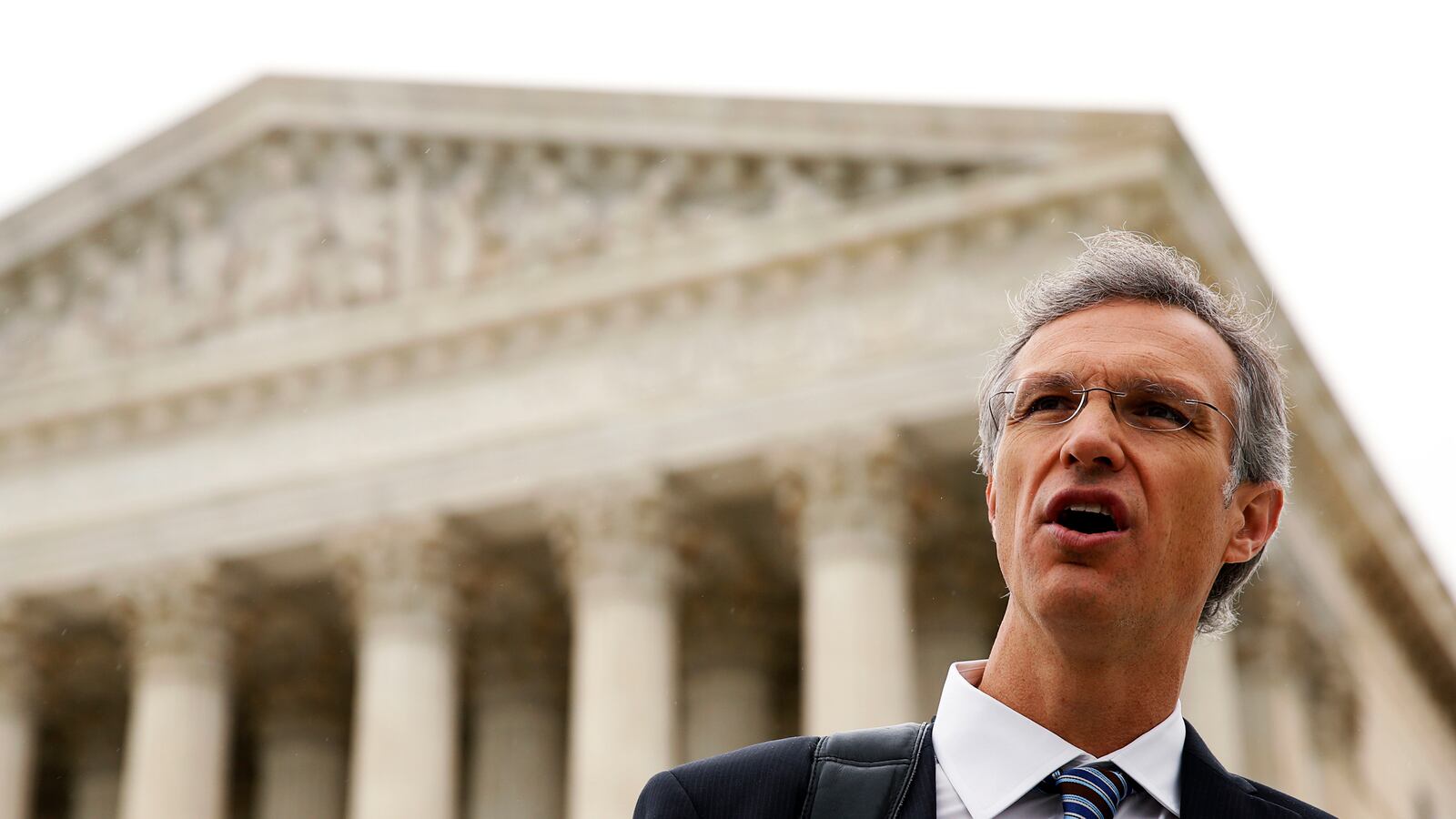Justice Anthony Kennedy rarely sounds plaintive. But an hour into Tuesday’s arguments about the Fourth Amendment and cellphones, he struck a sorry note, asking the government’s lawyer, “Do you have any limiting principles?”

Two cases argued in the Supreme Court on Tuesday pose the question whether police can, without a warrant, search a cellphone found during an arrest. On one side, California and the federal government point to a 1973 decision in which the Court announced a bright-line rule that arresting officers could lawfully search any container found on or near an arrestee—even a “crumpled package of cigarettes.” As California’s lawyer put it, if that applies to a photo in a billfold, shouldn’t it apply to a photo saved digitally in a phone? Especially one like the shot of petitioner David Leon Riley flashing gang signs and lounging about a vehicle used in an earlier homicide.
Applying the Fourth Amendment to street stops, the Court has long preferred bright, clear rules that give wide berth to police. Why, asked Justice Department lawyer Michael Dreeben, should cellphones be different? Indeed, the need for government access to cellphones, which often contain troves of incriminating material, is far stronger than its interest in cigarette packages.
Elaborating the government’s worries, Dreeben explained that if cellphones could not be searched immediately, built-in encryption would toggle on, creating an “insuperable barrier” and rendering the phone useless as evidence.
Riley’s lawyer, of course, conjured a different set of concerns. There are now likely more cellphones than persons on the planet—and many are in citizens’ pockets in the United States. Many, like Riley’s, are so-called smartphones, and contain the sort of information that, a mere decade ago, would have required a large box to house. Taking advantage of that processing power, Justice Kagan noted, “most people now do carry their lives on their cellphones” in the form of address books, social media accounts, and even access of banking and medical records. This was no mere “crumpled package of cigarettes”: It was as if everyone had suddenly taken to walking away with an intimate diary of their personal, professional, political, and even sexual lives.
The Fourth Amendment, Riley’s lawyer observed, had been ratified to preclude wide-ranging “general warrants” used by the colonial authorities. Applying the standard rule for searches pursuant to arrests in the cellphone context, and then allowing police to keep on file what they find for years to come, smacked more than a bit of those intrusive state instruments.
Compounding the conundrum further is the fact that many cellphones allow direct access to information in remote cloud storage. By coincidence, the Justices recently heard arguments in the Aereo case, and expressed concerns about preserving the economic viability of cloud computing. A rule that allowed government unfettered access to the cloud merely by making an arrest would likely impose serious economic harms to those nascent services. Even the government on Tuesday felt compelled to walk away from any suggestion that warrantless searches incident to arrest permitted access to the cloud.
Nevertheless, in the government’s eyes, any privacy concern in the phone itself was diluted by the fact of a lawful arrest. Here, Justice Kagan countered: Earlier cases allow police to make arrests even for misdemeanors that do not themselves carry jail time—such as driving without a seatbelt. And the Court had repeatedly resisted the idea of having the rules of the game in street stops change depending on whether the offense was serious or a misdemeanor.
Instead, the Justices tired themselves out working through several different middle positions. Justice Scalia liked the idea (drawn from his earlier opinion) of allowing the search if police are looking for the evidence related to the crime of arrest. Justice Breyer embraced the idea of having the power to search a cellphone in an emergency. And Justice Sotomayor batted about the possibility that police would be required to place a phone in airplane mode while they secure a warrant, rather than searching it directly. Chances are one (or more) of these narrow rules will emerge as a nationwide rule from these cases, leaving open many other puzzles about cellphones and privacy.
Perhaps unfortunately, none of the justices showed any appetite on Tuesday for rethinking the breadth of police power to search when making an arrest. This set of Fourth Amendment rule has gotten the Court into tricky line-drawing problems before. Once, the Court allowed police to search automobiles thoroughly when making arrests related to moving violations. This created the obvious risk that police would make stops and arrests simply to search cars for drugs. The search-incident-to arrest power stopped merely keeping police safe when making lawful arrests. Instead, it drove police to make more arrests and more searches. Dreeben’s argument against encryption on Tuesday demonstrated that this tail-wags-dog dynamic is at play in the cellphone context too.
In 2009, the Court backed down from the broad rule for vehicle searches attendant to arrests. But its new limits on police authority for vehicle search when making arrests are, to say the least, messy and not terribly coherent. More of the same might well be anticipated here.
Even if the Court does settle on a compromising solution, it may not matter much—at least for smart crooks and smart cops. The clever criminal will obtain a device that stores nothing locally, instead sending all data to the cloud every few minutes, and that is constantly encrypted. And the clever officer will simply figure out which magistrates in her jurisdiction have an itchy finger when it comes to issuing warrants. For all its anguishing, the Court is actually a bit-player here. As is often true, it is the direction of new technology, and perhaps whatever intervention Congress can muster, that will really determine the fate of the snapshots on your cellphone and mine.





